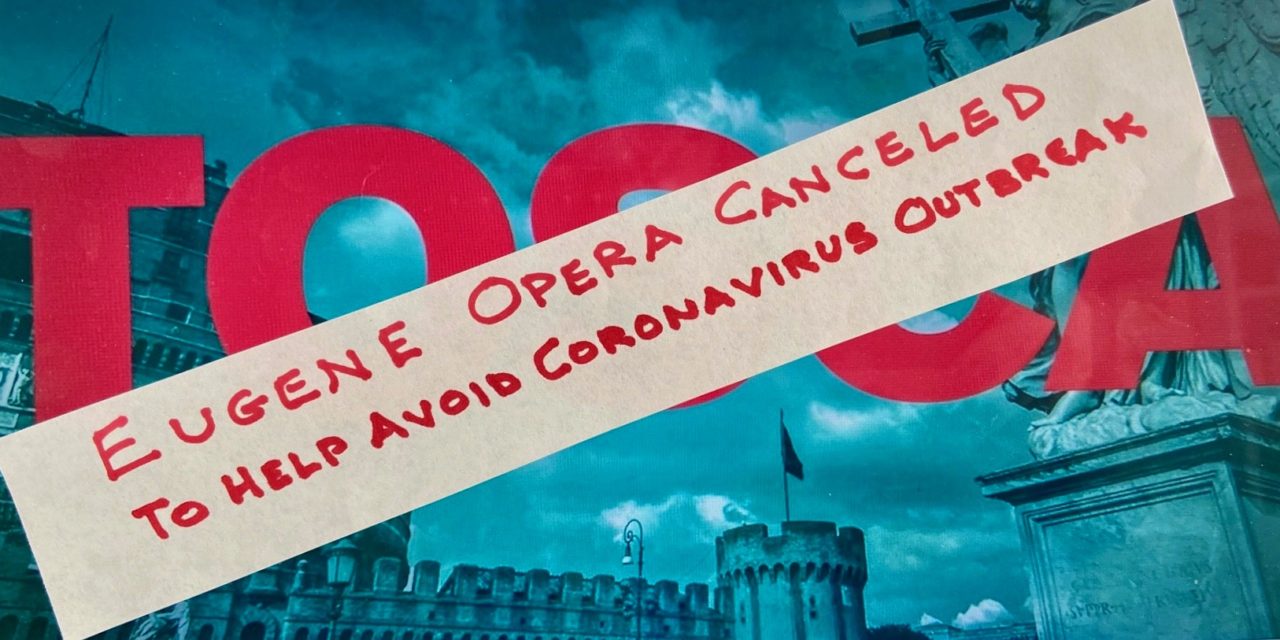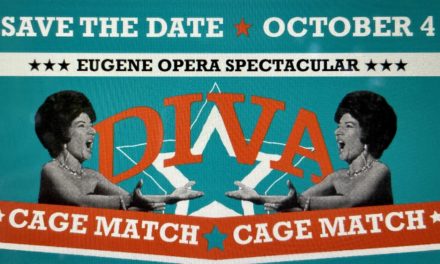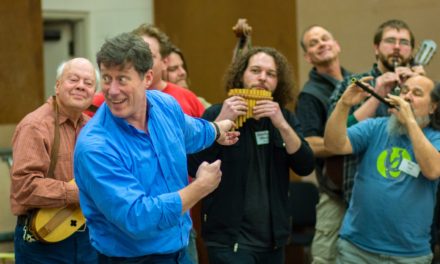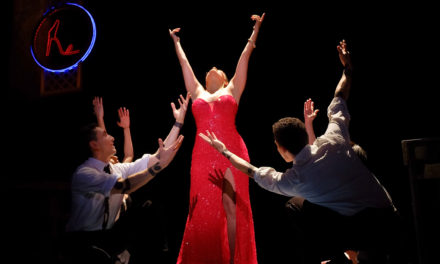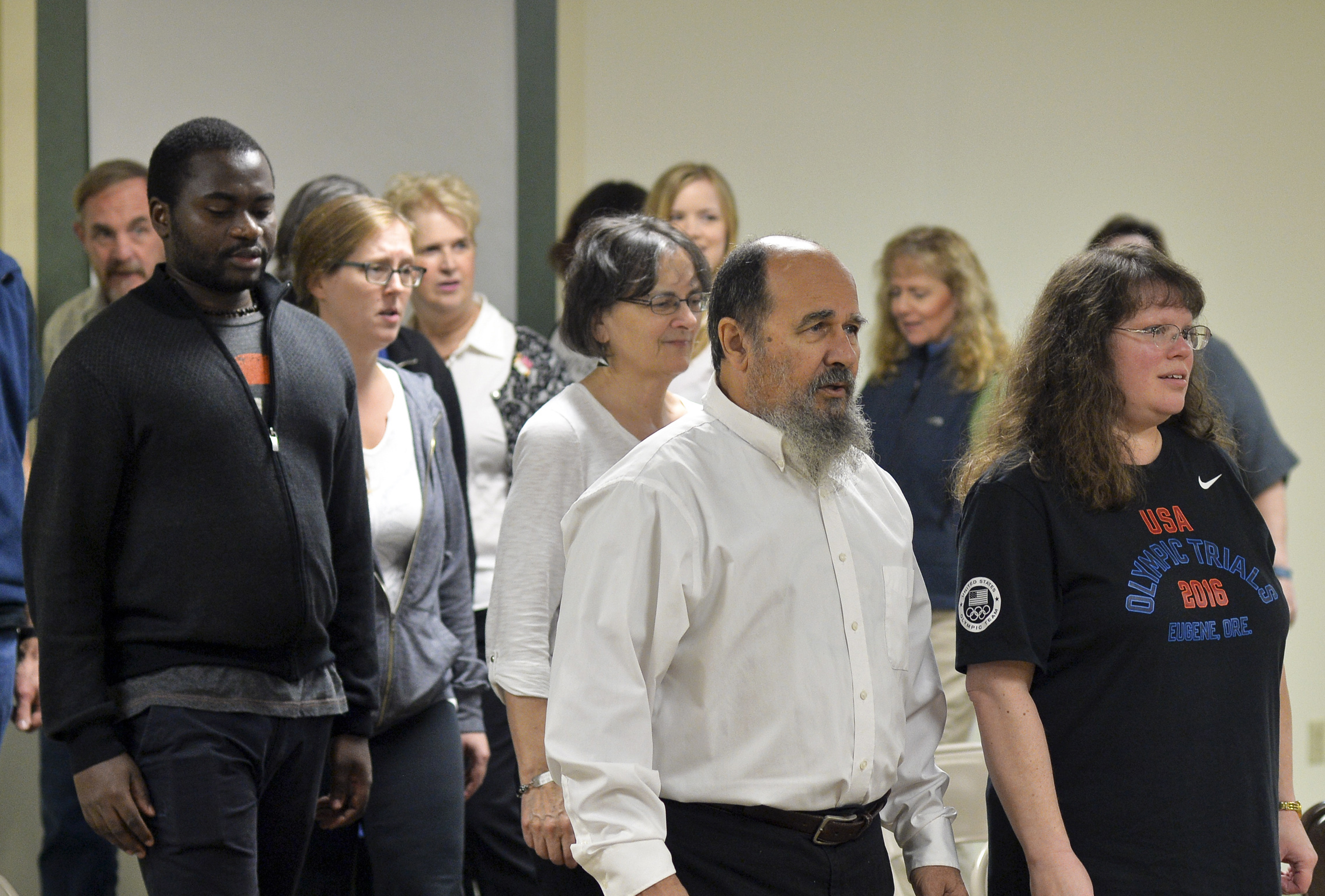Here’s the official word from Eugene Opera executive director Erika Rauer on the decision to cancel the March 13 and 15 production of Tosca:
Statement from Eugene Opera on Tosca Cancellations:
In collaboration with the Hult Center for the Performing Arts and the City of Eugene, we are deeply saddened to announce that we are canceling our performances of Tosca on March 13 and March 15. We are very disappointed that we are unable to bring our production of Tosca to the community this weekend.
Given Oregon Governor Kate Brown’s order canceling events with more than 250 people – and our concern over the growing threat of this fast-spreading virus—we must make this difficult and painful decision. Your safety and well-being, and that of our cast, crew, orchestra, venue staff and others, remain our priority.
We concluded our final dress rehearsal just last evening after weeks of hard work and months of planning. This opera would have been a stellar event, bringing world-class talent to Eugene to join our gifted and dedicated professionals in performances never to be forgotten.
As you can imagine, the cancellation of our biggest production of the season has potentially devastating financial impacts for our small company. The majority of the costs of this production have already been incurred, and we will not benefit from box office revenue to offset these costs.
The Hult Center will automatically refund the price of your ticket at the point of purchase; however, we hope you might consider supporting Eugene Opera by making a contribution to the Opera. You can do that directly on the Eugene Opera website at eugeneopera.org or by sending a contribution to the Opera at 1590 Willamette Street, Eugene, OR 97401.
We remain grateful to our Eugene Opera community—our patrons and donors, our performers and staff—as we work together to overcome this challenge and bring extraordinary artistry to Eugene.
In difficult times, our strongest asset is the support of our community. We’re proud to be Eugene’s Opera.
By Randi Bjornstad
Giacomo Puccini’s Tosca, one of the absolute classic operas of all time, had its premiere performance in Rome almost exactly 120 years ago, in January 1900. It comes to the Eugene Opera stage at the Hult Center for the Performing Arts on March 13 and 15.
Believe it or not, Tosca is described as a “political thriller,” originally set during the Napoleonic Wars but staged here to evoke Italy in the early 1930s. An important political prisoner named Cesare Angelotti escapes and seeks out his friend Mario Cavaradossi, who’s painting a portrait of Mary Magdalene in a church. Cavaradossi locks the door while the two talk. His lover, the famous — and very jealous — opera singer Floria Tosca, comes to the door and finds it locked, so she suspects he is there with another woman, but he assures her he is not. Then he and Angelotti quickly leave.
Baron Scarpia, the chief of police, arrives on the scene searching for Angelotti and suspecting that his friend, Cavaradossi, has helped him escape. Eventually Cavaradossi is found, imprisoned, and tortured, and Scarpia tells Tosca that he will execute her lover by firing squad unless she submits to his lust for her. Desperate, she agrees, and he tells her there will be a mock execution so that everyone will think Cavaradossi is dead while the two escape, and at her request he gives her a letter guaranteeing them safe passage. While he’s doing that, Tosca discovers a dagger among his things, stabs him, grabs the letter and leaves.
Meanwhile, Cavaradossi has persuaded a jailer to let him write a farewell letter to Tosca. While he is doing that, she runs in, tells him that she has killed Scarpia and that his execution will be faked but that they then can flee unharmed with the letter.
The firing squad arrives, Tosca hears the shots, and when she goes to meet Cavaradossi, she discovers that Scarpia has lied, it was not a mock execution at all, and Cavaradossi is dead. She then hears shouting that Scarpia has been murdered, and that soldiers are coming for her. She rushes to the top of the parapet and leaps to her death.
Eugene Opera’s executive director, Erika Rauer, has crafted question-and-answer interviews with conductor and artistic director Andrew Bisantz and the primary singers performing in Tosca.
See those Q&As just below the following performance information:
Tosca
When: 7:30 p.m. on Friday, March 13; and 2:30 p.m. on Sunday, March 15
Where: Silva Concert Hall, Hult Center for the Performing Arts, One Eugene Center (Seventh and Willamette streets) in downtown Eugene
Tickets: $29 to $89.50, available at the Hult Center box office, 541-682-5000, or online at hultcenter.org
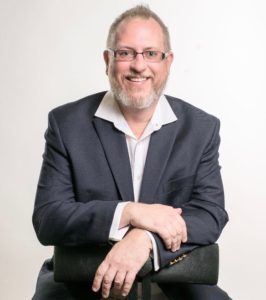
Andrew Bisantz, Eugene Opera artistic director and conductor
MEET ANDREW BISANTZ (Conductor and Eugene Opera artistic director)
Andrew Bisantz has conducted more than 60 productions for companies across the United States, including Florida Grand Opera, Opera Saratoga, Opera Tampa, McGill University, the Buffalo Philharmonic Orchestra, Virginia Opera and more.
To get to know him better and his thoughts on the upcoming production of Tosca, we asked Andrew a few questions.
What is your interpretation of the time period the show takes place? Why that era?
Our Tosca is set in the traditional locations of the opera, but we have chosen to make the costumes reflective of a more modern era in history – specifically, the 1940s. While the story is timeless, both director David Lefkowich and I feel that having the production look match more recent history gives the story more identifiability, with an even stronger visceral impact.
How do you feel this show parallels present-day political issues like the #metoo movement?
This opera is but one example of how stories that we revisit over and over can reflect current times – in the case of Tosca, evil and abuse of power are sadly as current as they were when Sardou wrote the original play. And, like many of our current day heroes, Tosca chooses an impossible solution requiring her self-sacrifice (in her case, literally) to guarantee that others do not suffer her fate.
Why do you feel it’s so important to work with the Oregon Children’s Choir?
The OCC is a terrific arts organization, so it’s wonderful for us to be able to partner with them. While it’s great fun for us to have them participate, I’m even more excited about the fact that these young musicians are being introduced to Puccini’s glorious music – there’s not much that matches the excitement of singing in the Act I “Te Deum”. I’m hoping that this experience will be one that stays with them for a long time, wherever their lives take them.
How does the uniqueness of the rehearsal space (Emerald Square Dance Center) influence the show?
When we’re looking at a rehearsal space, our needs are very specific, and we’re INCREDIBLY lucky that we were able to find any space that matches those needs – be it a warehouse (heated, of course), a college campus (LCC is a frequent partner), or, in this case, a fantastic square-dance center in Springfield.
We are deeply grateful to Emerald for their partnership, and while the aesthetics of the space don’t influence the production, we’re all delighted to see all the signs, banners, plaques, and accouterments of a dedicated community.
How does this show differ from other shows you’ve directed either stylistically or method?
Puccini requires a very specific skillset from a conductor – the music is symphonic in scope (requiring a virtuoso orchestra comfortable in late-romantic orchestral repertoire), with a strong bel canto influence as well as a structure, making the music an equal partner in storytelling.
One of my teachers once said, “if you can master Puccini, you can pretty well conduct everything else” – meaning, anything that is ever required of one as a conductor is here in this score. I’ve been lucky enough to have worked on his music for much of my conducting career, but it’s never not an intellectual, musical, and physical workout.
Where does your passion for opera come from? What does opera mean to you?
I grew up with a dual musical aesthetic – a love for Beethoven, Mozart, Brahms, etc. from my piano (and violin and horn) studies, but also a great love of the American musical. I didn’t really discover opera until college (piano majors play for voice studios), and Tosca was actually one of the first operas to completely hook me – it was the perfect combination of those two musical worlds which were always competing for my attention.
I love everything about opera – the theatricality, the sweep of storytelling, the grandeur of a production (of any scale – even chamber opera is truly larger than life), but mostly the music and the beauty of the human voice: if Jill doesn’t get your motor running with her glorious interpretation of “Vissi d’arte”, you need to get your oil changed.
Seriously, though, I’ve had a lot of time to reflect on the purpose of opera and whether it remains a valid way of storytelling – the good news is that the answer is right in front of us, with thousands of classical voice majors dedicating themselves to this craft every year, with the composition of so many new works, and with the passionate love of the audience for those operatic experiences that mean so much to them.
But personally, every time I think about other art forms equaling or replacing this one, this unique way of expressing the human condition and experience, I come back to the fact that nothing comes close. What a privilege to be a part of it!
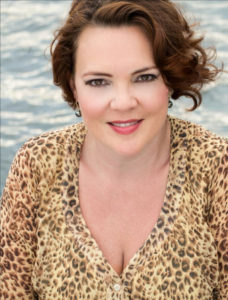
Jill Gardner
MEET JILL GARDNER (Tosca)
Why do you think Tosca has been so popular for so long? What about it do you think stands the test of time?
The opera of Tosca has been popular for so long because it packs a musical and dramatic punch in about 2 1/2 hours!
The themes of the opera — LOVE, SEX/POWER, and DEATH — have intrigued people since the beginning of time and are brilliantly displayed in this triangle of characters within the opera:
Tosca, a famed singer in love with a revolutionary painter, Cavaradossi – both of whom are being hunted down by the evil and violent Roman Chief of Police, Scarpia.
With Puccini’s music encompassing a storyline of intense drama, any audience is swept along with tsunami-like fervor to the deaths of all three main characters. And if the three leading singing-actors have great chemistry between them, one could say the opera is like the Netflix series, “House of Cards,” but on steroids!
ve which is our “guide on earth and our helmsman at sea.”
What’s the most rewarding part of being in this show?
The most rewarding part of being in this opera is that I find a completely satisfying synthesis between myself personally as Jill Gardner and the character of Floria Tosca. This role is a singular fit for me vocally, musically, temperamentally and even physically.
What made you want to pursue a career in opera?
Words and text! Having started piano lessons at the age of 5, I received a full scholarship to receive my Bachelor of Music in Piano Performance with aspirations to become a concert pianist.
Although I had sung all my life in the church and in musicals in high school, I never dreamt I would become an opera singer. But during this Bachelor’s Degree, I also minored in voice and it was during this time I truly discovered I could become a legitimate singer and sing fabulous poetry (another LOVE of mine!) I went on to get my Masters in Vocal Performance and the rest is history!
Describe your character in 3 words?
The three words for me that best describe the character of Tosca are: passionate, determined and ardent.
But these three attributes are always tempered by the deep undercurrents of her vulnerability and insecurity which lie close to the surface… always.
What is your favorite aria to perform from the show? Why?
Most people would think my favorite aria of the opera is the famous showstopper “Vissi d’arte” and in many ways it is. It is the most fervent prayer Tosca has ever prayed and I love how it ends in a question to God which is truly not answered. It is definitely her personal “Job moment” (as from the Bible).
But, I absolutely love the Act I & III love duets with Cavaradossi as well. There are moments in both these duets that are my favorite music of all — my little arioso in Act I “Non la sospiri la nostra casetta,” which shows Tosca’s fun and spontaneous self, totally in love with Cavaradossi (not the diva Tosca is known for). The other, the Act III duet, has rhapsodic and yet tender music shared with Cavaradossi where we sing of the joy and beauty which we have found in each other, completely rooted in love which is our “guide on earth and our helmsman at sea.”
What was the first opera you ever saw? Do you remember how the experience made you feel?
The first opera I ever attended was Mozart’s “Le nozze di Figaro” with Piedmont Opera in my hometown of Winston-Salem, NC through my public school’s music program. I was in the 6th/7th grade and was truly mesmerized! My mother saved a letter I wrote for one of my class assignments that year where I write about having experienced my first opera.
Ironically, the last line of that letter says, “I think opera will become a very important part of my life!” Little did I know then how truly fortuitous that statement would become!
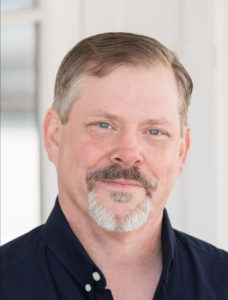
Malcolm McKenzie
MEET MALCOLM MCKENZIE (Baron Scarpia)
Why do you think Tosca has been so popular for so long? What about it do you think stands the test of time?
I always say that Tosca is the perfect opera for today’s audiences. It’s a movie-length love triangle about a bigger than life Opera star, with political intrigue, a baddie you love to hate, incredible music, and by the end, everybody dies! I mean, what could be better?
Describe your character in 3 words?
Baron Scarpia: Powerful, Sexy, Manipulative.
What’s the most rewarding part of being in this show?
I don’t get to sing all that much Puccini. It’s always a pleasure when I get to sing this gorgeous music. Add to that being able to portray one of the best villains ever… I mean… amazing.
What made you want to pursue a career in opera?
I was very fortunate to have several wonderful teachers to encourage me. The road to a professional singer is long and difficult. Without their help, it wouldn’t have been possible.
What was the first opera you ever saw? Do you remember how the experience made you feel?
The first Opera I saw was Don Pasquale when I was about 13. I’d seen lots of musical theater and operetta before that because my uncle was an amateur baritone in a Gilbert and Sullivan performance group.
The first time I saw an opera and said “I want to do that” was a performance of The Marriage of Figaro a friend brought me to when I was 19. Sir Thomas Allen was portraying the Count, and his performance was so amazing that it had a profound impact on me. Amazingly, years later, I got to know him while being his understudy on a couple of different operas. He was so incredibly kind and encouraging to me. I’ll be forever grateful to him for that.
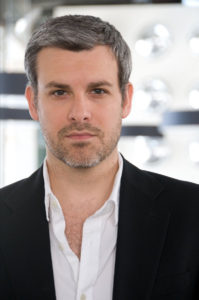
Derek Taylor
MEET DEREK TAYLOR (Cavaradossi)
Derek is an American tenor who has been praised greatly for performances all across the United States and Europe, including Santa Fe Opera, Hawaii Opera Theatre, Theater St. Gallen, Metropolitan Opera, Virginia Opera, Opera San Jose, and more.
To get to know him and his character better, we asked him a few questions about his upcoming performance in Tosca.
Why do you think Tosca has been so popular for so long? What about it do you think stands the test of time?
Tosca is an incredibly modern story, which I believe along with the timeless score, have kept it among the most performed operas internationally. I know from the artist’s standpoint, Tosca has such incredible meat for everybody involved — it creates a real energy that I usually do not feel with other pieces. Whether it’s the singer, director, conductor, orchestra, or costume designer, there is a real excitement to perform the show, and I think that reads for the audience member. Tosca is always such a visceral experience live.
Describe your character in 3 words?
My character of Cavaradossi is passionate, idealistic, and brave.
What is your favorite aria to perform from the show? Why?
I always love the famous “Vittoria” scene. I love the idea of Cavaradossi standing up to tyranny, knowing it will lead to certain imprisonment and even death. That kind of bravery is very moving to me.
What’s the most rewarding part of being in this show?
I love the audience’s reaction. It is always so rewarding to feel the energy in the room during certain moments of the show. I also love the collaboration with the artistic team as well. Everybody has to bring their A-game for a piece like this, and it’s exciting being a part of that.
What made you want to pursue a career in opera?
Well, honestly being so young when I made this decision there was a lot of idealism involved. A career in the arts is certainly difficult, but I am thankful every day that I get to display and promote this art form that I love so much. The idea that a performance might inspire one or two life-long opera fans gives me an incredible feeling of responsibility, and I feel so honored to be one of classical music’s ambassadors.
What was the first opera you ever saw? Do you remember how the experience made you feel?
The first opera I ever saw was Tosca! I will never forget as the curtain came down after the “Te Deum” I thought to myself “I want to do that!””
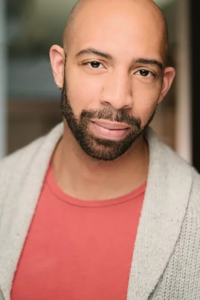
Damien Geter
MEET DAMIEN GETER (Angelotti)
Why do you think Tosca has been so popular for so long? What about it do you think stands the test of time?
There are certain elements in opera that make them timeless and relatable. Even though the stories are sometimes outrageous, audiences connect with the visceral emotion of the characters, the drama, and of course, the music. To put it plainly, Puccini knew how to write a melody.
Describe the show in 3 words?
Passion, murder, obsession.
What is your favorite moment to perform from the show? Why?
Well, I only sing in the beginning, but someday I hope to sing Scarpia. As for Angelotti, everyone remembers him since he sings first and has some good moments of real singing. Even though the part is small, it showcases the singer in a nice way.
What’s the most rewarding part of being in this show?
I’ve never been in Tosca, so I’m looking forward to getting to know it more.
What made you want to pursue a career in opera?
I sang as a child. I never thought I’d be an opera singer until my professor in college encouraged me. I really love opera. It’s so vulnerable for all involved and is a wonderful conglomeration of all the arts.
What was the first opera you ever saw? Do you remember how the experience made you feel?
The first thing that was close to an opera that I saw was The Mikado. I don’t remember much from it except I thought it was very colorful. The first REAL opera that I saw was Elektra believe it or not. That’s when I thought… hm.. this is really something special.

